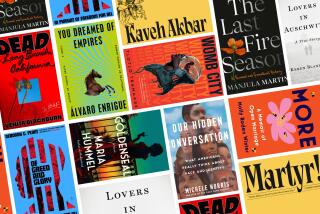Time After Time
- Share via
And so the new year rolls in like a storm off the sea, full of changing light and shifting winds, and we pause in the first seconds of its birth to consider time.
This is, after all, when we should reflect on the devil of our existence, that shadow in the foreground that can never be caught, that distant dancer on the far edge of life.
I pondered time in two ways. One was in the small shop of Bill Roth, surrounded by a hundred clocks that bonged and ticked and cuckooed and chimed, sometimes in sequence, sometimes all at once.
Roth repairs antique clocks on a nondescript block in the San Fernando Valley, a balding man of 60 hunched over his workbench like something out of a fairy tale, unaware of the changing patterns of sound that fill the room.
I sought him out because I had an old clock I wanted repaired, a clock that has bonged the hour in our house for many years and one day went suddenly silent.
“Take a look at it,” Roth said, in that elliptical manner of speech that seems to characterize experts at anything.
The grandson of a Cossack, he’s been doing this kind of work for almost 30 years, most of it in L.A.
He used to have a precision instrument repair shop, he’ll tell you, and then a friend got him interested in fixing old clocks. Roth studied under a 70-year-old steeple clock man in England who used to repair Big Ben and now, as he says, “Here I am.”
Tick-tock, tick-tock, tick-tock . . .
*
You ought to see his place. He’s got clocks worth up to about $20,000. There are clocks on his workbench, clocks on every wall, clocks on counters, clocks on tables, clocks on the floor . . .
Over here’s a French prayer clock that dates back to 1867. Here’s a Hickory-Dickory-Dock clock with a plastic mouse that runs up and down. There’s a Chinese Monet clock in the style of the artist, and a German box clock looking stern and foreboding.
I got to thinking as I looked around what a great New Year’s column this would make. Time ticking past in clips of sound. A little gimmicky maybe, but when you’re always scratching around for ideas, a little gimmick doesn’t hurt sometimes.
But when I got to talking to Roth about time he allowed as to how he doesn’t think about time at all. He just thinks about clocks.
“Ain’t worth a damn if they don’t go tick-tock,” he said, not looking up.
“But you’re surrounded by time,” I said, clinging to an idea.
“Surrounded by clocks,” he said.
“When you get the clocks working again, you have to consider the time.”
“Only set the minute hand,” Roth said. “Don’t worry about the time.”
Every clock is a challenge, with a personality of its own. Roth spends hours hunched over each one. He repairs it, then hangs it on a wall behind him to make sure it keeps ticking.
He seems to ignore it after that, the ticking of one clock blending into all the other tick-tocks, but he can tell if it stops, the way unexpected silence can awaken us in the night, listening for something that suddenly isn’t there.
“How can you tell?” I asked.
“I can tell,” he said.
Tick-tock, tick-tock, tick-tock . . .
*
I said I considered time in two ways. One was the ticking of clocks around a man only aware of the mechanism that charts it. The other was a telephone message waiting when I got home. Adolph Brunn was dying.
He was an old friend from the Korean War, and when I called him he said they’d given him two months to live. The Big C, he called it. Cancer.
“Actually, that’s not bad,” Brunn said with a cheerfulness that wasn’t a bit strained. “Most people just drop dead with no time to get things in order. I’m one of the lucky ones. I’m even writing my own eulogy.”
Brunn dying? Impossible. Not awkward, puppy-like, happy-go-lucky Brunn. Not the guy who could make us laugh under the most desperate circumstance. Not Brunn.
I see him on a dusty trail outside of Pusan. He’s smiling and waving and shuffling toward me with a kind of pigeon-toed gait. Hey, Martinez! I wonder what the poor people are doing. . . .
“Our lives are just sparks in eternity,” he wrote in the eulogy.
Then: “I have built no bridges, no high-rises. I was never president of a bank or a large corporation. All I ever wanted was to be a good husband and father. I have no fear of standing in this judgment. . . . “
Bill Roth had a book in his shop called “Clocks and Watches” by Johann Willsberger. In it was a phrase. It said, “An inch of gold will not buy an inch of time.”
Brunn was pure gold. He died on Christmas Eve.
Tick-tock, tick-tock, tick-tock . . .


